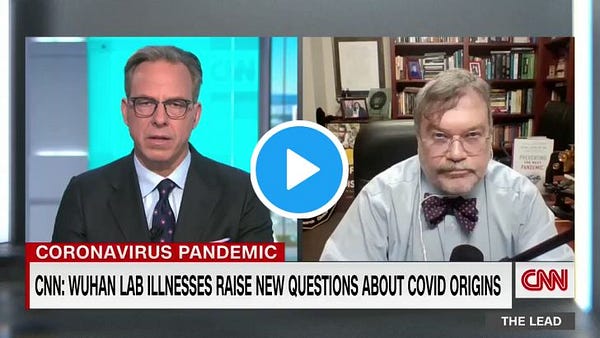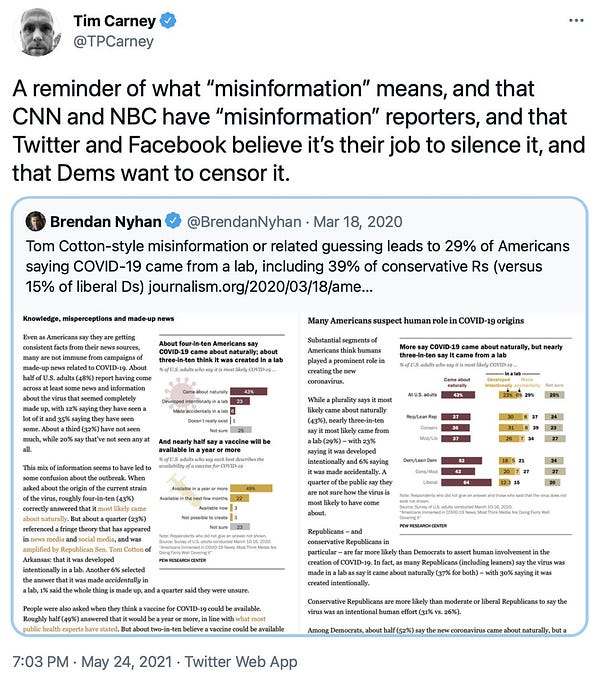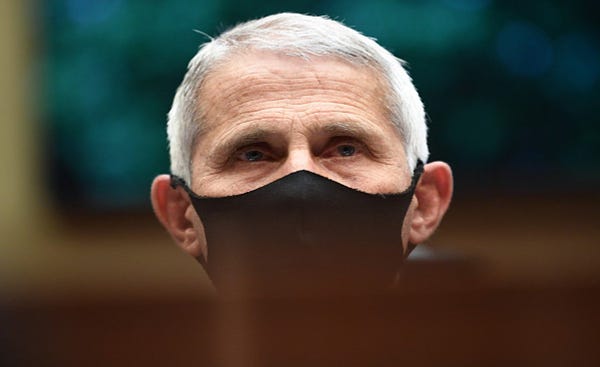Within the space of a week, a cluster of theories called “lab leak” went from being considered misinformation and a mountain of conspiracy theories to, essentially, the mainstream. I’m not going to get into the details of the process here because it’s genuinely complicated. I have a lot of thoughts on this, but it deserves its own considered essay. Still, even at first glance, there are important lessons.




The cluster of “lab leak” theories itself needs unpacking, as it includes claims that seem to range from plausible but uncertain to what I’d consider unlikely and distracting. But nonetheless, it’s useful to walk through one example of a “fact-check” from Politifact from last year that has recently been “archived”:
You can see that the post pertains to one version of the claim, that COVID-19 was created in a lab because of research purposes. (As I said, a cluster of claims is being conflated, and this is but one version).
Just consider the tone of the “fact-check”:
In a Sept. 15 interview, the most-watched program on cable network television aired a conspiracy theory that has been debunked since the beginning of the coronavirus pandemic.
"Give us, for a non-scientific audience, a summary of why you believe this virus came from a lab in Wuhan," said Fox News host Tucker Carlson during his self-titled primetime show.
Dr. Li-Meng Yan wasted no time.
"I can present solid scientific evidence to our audience that this virus, COVID-19 SARS-CoV-2 virus, actually is not from nature," she said. "It is a man-made virus created in the lab."
Over the next six-and-a-half minutes, Yan, a virologist and former postdoctoral fellow at the University of Hong Kong, explained that the Chinese government created the coronavirus in a Wuhan lab and released it intentionally. The virus’ genome, she said, indicates that it was modified. She accused the Chinese Communist Party of silencing those who claim otherwise.
"It’s hard to be shocked in a moment like this, but you have succeeded in shocking me," Carlson said at the end of the interview. "Unfortunately, this is not the forum for the details of your research; I don’t have the grounding necessary to ask you the right questions."
Scientists do. The consensus of the scientific community and international public health organizations is that the coronavirus emerged from bats and later jumped to humans.
But the doctor’s interview on "Tucker Carlson Tonight" quickly took off, inspiring a rash of social media posts parroting her claims.
One does not need to be a devoted fan of Dr. Yan’s particular version to realize that this isn’t really a fact-check but a dismissal beyond the existing evidence base then or since.
An honest evaluation in September 2020—before the WHO investigative trip and everything that has been revealed since—would be something along the lines of this: “We don’t know and there are a lot of conflicting opinions about this, and the evidence base is incomplete and different groups of scientists have different views. We are not in a position to assign plausibility levels because that’s what scientific debate is about and we are not scientists or investigative journalists, and we are supposed to fact-check things that are clear facts, not resolve complex scientific debates taking place in a politically-charged landscape”.
Instead, Yan is pitted against “scientists” who are presented as if they have a singular view and consensus on this topic. The idea that the coronavirus is completely zoonotic without any plausible involvement by the lab is presented as somehow being completely established beyond any reasonable doubt, and thus a conspiracy theory .
And the last sentence in the post is especially striking: social media is seen as the place where people just “parrot” Dr. Yan’s claims, misinformation which is presumably to be countered by this fact-check. However, the fact-check itself isn’t even an explanation, it’s a series of parroting itself, of what the authorities said at the time, and the post even makes some claims that are outright false. (There is a lot of debate around how we’d be able to tell if and the likelihood that a virus had been altered—whatever you believe about this case doesn’t justify making unsupportable claims like this).
Scientists worldwide have publicly shared the genetic makeup of the coronavirus thousands of times. If the virus had been altered, there would be evidence in its genome data.
But there isn’t. In March, several microbiology, infectious disease and evolutionary biology experts wrote in Nature — a respected scientific journal — that the genetic makeup of the coronavirus does not indicate it was altered.
Instead, scientists have two plausible explanations for the origin of the virus: natural selection in an animal host, or natural selection in humans after the virus jumped from animals
"Our analyses clearly show that SARS-CoV-2 is not a laboratory construct or a purposefully manipulated virus," the researchers wrote.
Since that article was published, public health authorities have repeatedly said the coronavirus was not derived from a lab.
We’ve seen similar processes play out again and again in this pandemic. Deviating from the authorities was seen as “misinformation” and subject to fact-check and ridicule.
For example, I’ve long seen claims that delaying boosters and mixing-and-matching vaccine types being portrayed as unscientific when, in fact, they were both mundane practices before the pandemic, and dose-sparing is a crucial strategy to consider given the vaccine supply. I’m particularly familiar with the latter claim because I co-wrote an op-ed back in December calling for a trial of such dose-sparing strategies and, to our surprise, it was treated as… a controversy so much so that Science published an editorial about it saying it’s fine to discuss all this!
Lo-and-behold, we now find that delaying boosters *improves* the protection that the vaccines provide (something that is not surprising given our previous knowledge on this topic).


We now know that mixing vaccine types also produces a stronger immune response, which is, again, not at all a surprise because these are common practices (called heterologous boost) and the results are in line with expectations. (You might remember that I wrote a newsletter post about the faux-controversy around this idea).


Of course, it was also possible that these vaccines wouldn’t work out this way with a delayed booster—even if one had thought it was likely to be so based on previous examples. That’s why it’s good to have trials and studies to check these things! But neither was some wild, controversial claim, or some sort of deviation from the True Path Of Science.
Without commenting on the plausibility of the different versions of the origin theories of COVID-19 (as I said, it deserves a separate considered piece, not off-hand remarks), can we at least acknowledge that what happened past year is no way to check any “facts” or even fight misinformation?
If anything, all this overreach and hurry to declare everything a conspiracy theory or “not following the science” just helps erode what trust authorities or fact-checkers may have had in their pronouncements.
Imagine that in a few years, we do get some evidence that really helps resolve the question one way or the other, and the scientific community were indeed able achieve a consensus of sorts. Who’d believe it after this?






Lack of slack seems a big throughline in the past year's discourse. So much soldier mindset (to borrow Julia Galef's phrase), racing to head off conspiracy theories and distortions by the other political side, leaving little space to grapple with uncertainty. That's another reason the contributions of Zeynep and others, keeping a step back from the conflict, have been so valuable. Officials and influential communicators may have to let go of the notion they can control the noise, and focus on quality of the signal.
Science is a wallow in uncertainty. Hearing or reading a scientist who can write about and address uncertainty without eliminating it leads to further trust.
Consensus so often is lead by scientific politicians seeking fame or career advancement from their publications that a watered down version of truth and even at times, untruth, is presented by consensus.
A coherent individual more often guides toward a truth than a consensus group.
Great coherent thinking and writing ✍️ here btw.